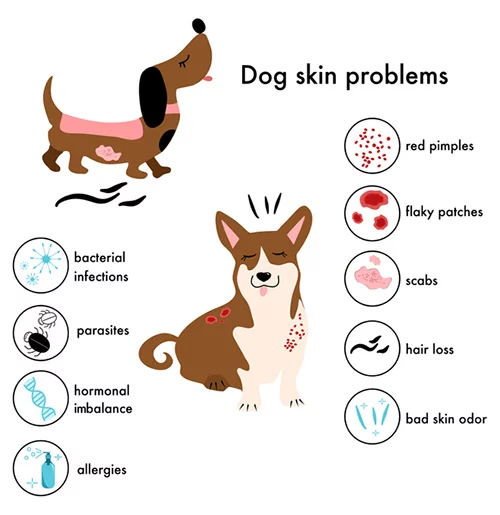Handy News To Selecting Kidney Failure In Cats
Wiki Article
Probiotics Help With Cat And Dog Skin Allergies.
Probiotics play a significant role in preventing skin allergies, as well as relieving allergies in dogs. Probiotics are beneficial for maintaining the health of the gut-microbiome that, in turn, supports the immune system and the skin. Probiotics can be beneficial to pets suffering from allergies:
Immune System Regulation
Balanced Immune Response:
Function: Probiotics help regulate the immune system through encouraging the growth of beneficial bacteria and blocking harmful bacteria from the intestine.
Benefits: A balanced immune system can reduce hypersensitivity reactions that cause skin allergies. This reduces the severity of and frequency of allergic reaction for pets.
Inflammation Reduction
Anti-inflammatory Effects:
Function: Certain probiotic strains have the ability to modulate the body’s inflammatory reactions and create anti-inflammatory substances.
Benefits - By reducing the systemic swelling, probiotics help to reduce itching, inflammation, as well as other signs of allergic reactions.
Gut-Skin Axis
Enhance your gut health:
Function: The gut and skin axis is the connection between gut health and skin health. Probiotics improve the function of the gut barrier and are essential for digestion health.
Benefits: A healthy gastrointestinal tract is able to stop the leakage into bloodstreams of allergens and chemicals that could trigger skin reactions. This can result in an improvement in allergic skin symptoms.
Strengthening Skin Barrier
Improve Skin Barrier Function
Function: Probiotics may affect the creation of ceramides and other lipids which are vital for maintaining the health of the skin barrier.
Benefits: A thick skin barrier guards against environmental allergens, and helps reduce allergic reactions and skin infections.
Allergy Symptom Management
Help to relieve symptoms
Function: Probiotics are able to ease symptoms by modulating release of histamines as well as other chemicals involved in allergy reactions.
Benefits for pets: This treatment may provide relief from itching and other signs of skin allergies.
Increase Microbial Diversity
Increased Microbial Variety:
Function: Boosts diversity in the gut microbiome.
Benefits An microbial diversity improves overall health and skin health by stopping the increase in bacteria that could create allergies.
Particular Probiotic strains
Lactobacillus or Bifidobacterium are two popular probiotic strains that have been proven to be effective at combating skin allergies in animals.
Lactobacillus Rhamnosus GG: It is known for its ability to improve gut health and reduce allergic symptoms.
Bifidobacterium helps in the reduction of inflammation as well as the improvement of the immune system.
Considerations and Usage
Dosage dosage, administration, and dosage: The dosage that is appropriate depends on your pet's weight, height, and health requirements. Follow the directions on the label, or those given by your veterinarian.
Formulations Probiotics for pets are available in a variety of forms, such as capsules, powders, and chews. Choose a product that is secure and beneficial for your pet.
Monitoring and side consequences: While probiotics typically don't cause harm however, it's essential to keep an eye on your pets for any negative reactions, like gastrointestinal upset. It is possible to reduce the risk of adverse effects by beginning with the lower dose, and then gradually increasing the dosage.
The conclusion of the article is:
Probiotics help dogs and cat owners control their allergies to skin by controlling immune function, reducing irritation, improving the barrier of the skin, and improving gut health. Regular use may result in the reduction of symptoms associated with allergies. It also promotes healthy skin for pets as well as an increase in the quality of their life. Read the top rated for beginners about collagen for dogs for website advice including pet lemon balm supplements, pet yucca supplements, pet whey protein supplements, pet supplements for pets with fear of handling, pet supplements for pets with fear of stairs and steps, pet supplements for pets with worms, pet supplements for pets with fear of new environments, cushings disease alternative treatment and more.

What Is The Best Method To Treat Kidney Failure In Cats As Well As Dogs Who Are Supplemented With Omega-3 Fatty Acids?
Omega-3 fatty oils like EPA (eicosapentaenoic acids) and DHA docosahexaenoic acid can support kidney health for cats and dogs. They can assist in managing kidney problems.
Anti-inflammatory Properties
Reduce Inflammation
Function: These fatty acids can reduce inflammation by reducing pro-inflammatory cytokines (cytokines) and eicosanoids.
Benefits - By decreasing the inflammation of kidneys, Omega-3s are able to slow the extent and severity of kidney damage.
Blood Pressure Regulation
Low Blood Pressure:
The function of Omega-3 acids is to regulate blood-pressure by improving the vascular system and decreasing general inflammation.
Benefits: Lowering blood pressure can help protect kidney function and also slow the progression of kidney disease.
Proteinuria Reduction
Reducing Proteinuria:
Function: Omega-3s may help decrease the leakage of protein into urine, a condition known as proteinuria, which is a common issue in kidney disease.
The reduction in proteinuria helps prevent further kidney damage and also helps preserve kidney function.
Glomerular Filtration Rate (GFR) Preservation
Supporting Kidney Filtration:
Function: They assist in ensure the integrity and efficiency of glomerular filtering, which is the process by which the kidneys clean blood.
Benefits Achieving an elevated GFR can slow the rate of progression and help preserve kidney function.
Appetit Stimulation and Nutritional Support
Improve Appetite
Function: Omega-3s are able to enhance appetite and nutritional intake of pets suffering from kidney disease, who typically have less appetite.
Benefits of a better diet It is a way to improve overall health in pets and help maintain muscle mass and weight.
Cardiovascular Health
Aiding Heart Health
Function: Omega-3 fats aid in the cardiovascular system by the reduction of inflammation, reducing blood pressure and improving lipid profiles.
Benefits: Better cardiovascular health will reduce the risk of complications associated with kidney failure, such as heart disease. It can also improve overall health and well-being.
Antioxidant Effects
Reducing Oxidative Stress:
Function: Omega-3 fatty acids have antioxidant properties that help reduce kidney oxidative stress.
Benefits: By reducing the oxidative damage to kidney cells, you can improve kidney function and slow disease progression.
Use and considerations
Dosage, administration and dosage: The amount of omega-3 acids that you administer depends on your pet's age and weight, health and size. The advice of the veterinarian or the product's label are important. Fish oil supplements specifically formulated for pets are a common source of omega-3s.
Omega-3 supplements can be found for pets in a variety of varieties. These include chews, liquid oils and capsules. Pick a reputable product to ensure safety.
Effects on the body: Omega-3 supplements are generally safe but some pets may have stomach upset. To avoid any adverse negative effects, begin by taking a small amount, and then gradually increase the dose. You should monitor any reactions that are not expected, such as vomiting or nausea.
Conclusion
Omega-3 fatty oils be beneficial in the management of kidney failure in cats and dogs. Their anti-inflammatory, blood pressure-lowering, proteinuria-reducing, and appetite-stimulating properties help support kidney function and overall health. Omega-3 supplements have been proven to reduce the rate of progression of kidney disease, improve the quality-of-life, and improve the overall health of pets with renal failure. Follow the top rated treatment for cushings disease in dogs for more info including pet digestive supplements, pet milk thistle supplements, pet aloe vera supplements, herbal pet treatments, kidney disease in dogs, pet memory supplements, pet supplements for pets with fear of sirens and horns, pet multivitamins and more.

Oregano Oil Is Very Effective For Treating Yeast Infections Of Pets And Dogs.
Oregano is commonly used to treat yeast conditions in dogs and cats because of its potent antimicrobial qualities. This oil is especially well against fungi like Candida. Oregano oil has proven effective in preventing yeast infections.
Antifungal Properties
Active Compounds:
Oregano essential oil contains carvacrol & thymol which are powerful antimicrobial agents.
Benefits: These compounds have been shown in studies to effectively inhibit fungi growth including Candida species, which cause yeast infections.
Antimicrobial activity
Broad-Spectrum Action:
Oregano oil is a potent antimicrobial agent that has many different activities. It is able to treat a range of pathogens including bacteria and molds.
Benefits: The capability to target fungal growth helps decrease yeast infections in dogs and cat, especially in areas like the ears and skin.
Anti-inflammatory Effects
Reduced Inflammation
Oregano essential oil is a source of anti-inflammatory components that help reduce the symptoms of yeast infections such as itching and inflammation.
Benefits: Oregano oil can reduce inflammation and can relieve irritation of the skin and mucous tissues affected by yeast.
Immune Support
Immune Modulation:
Oregano essential oil helps boost the immune system, by enhancing the body's natural defenses against infections.
Benefits: A stronger immune response can aid in the fight against yeast-related infections. It will also help prevent them from returning.
Use and aspects
Topical application Mix oregano and some carrier oil like coconut or olive oil prior to applying the oil topically. The dilution typically is 1-2 drops oregano per tablespoon carrier oil.
Avoid ingestion. The oils of oregano are extremely concentrated. They shouldn't be fed to pets under medical supervision. In large quantities, they can be toxic.
Patch Test: Prior to applying the cream to your entire body, do the test of a patch on a small area of your skin to check for any reactions that could be harmful or sensitivity.
Consultation with Veterinarians: Talk to your vet before applying oregano to treat yeast-related infections in pets. They can offer advice on proper dilution, application methods and possible risks depending on your pet's particular health issues.
Conclusion
Oregano oils antimicrobial quality makes it a possible natural treatment for yeast infections in dogs and cats. Its capability to fight fungal growth, ease inflammation, and improve immune function could aid in combating yeast infections successfully. To ensure safety and effectiveness the oil must be used carefully and under the supervision of a veterinarian. When used properly, oils of oregano are effective when veterinary advice is sought in conjunction with an integrated treatment plan for yeast infections. Read the top rated natural dog probiotics examples for website examples including pet allergy supplements, pet bromelain supplements, pet supplements for pets with fleas and ticks, pet supplements for pets with fear of ear cleaning, pet astragalus supplements, dog vitamins, pet holy basil supplements, organic pet supplements and more.
